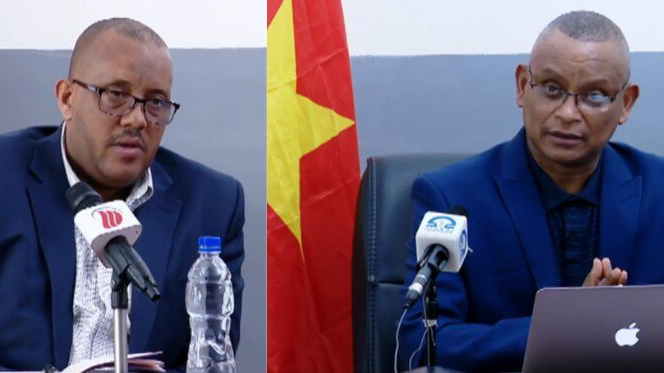The previously strong and united TPLF is now experiencing the most acute internal crisis in its history, and risks becoming easy prey for its external enemies.

The Tigray Conflict of 2020–2022.
However, no historical overview could claim to be complete in terms of understanding the current intra-party processes without taking into account the dramatic events of 2020–2022, when the federal government fought a war against the TPLF. Like any crisis—and the Tigray conflict was an existential threat to the TPLF, which found itself attacked not only by government forces but also by its worst enemies in the form of Eritrean and Amharic nationalists—the war of 2020–2022 exacerbated a number of contradictions that already existed within the party. Although the various political forces within the Tigrayan community have demonstrated an ability to unite, including by forming the Tigray Defense Force (TDF), the region’s formally politically neutral Armed Forces created to protect the population from existential threats, in practice it is the TPLF that has retained control over decision-making. However, the involvement of military and political figures who were either neutral or inclined to oppose the TPLF, as well as the need to constantly develop rapid and high-risk solutions, inevitably complicated relations between the leading functionaries. However, the Tigrayans’ defeat, and the fact that they were compelled to submit to their recent enemy—the government of Abiy Ahmed—has called into question the credibility of Debretsion Gebremichael, who took over the TPLF after the death of Meles Zenawi back in 2012.
Tigray: the post-conflict political landscape
The peace agreement signed in South Africa’s Pretoria in early November 2022 called for, among other things, the establishment of an interim administration for Tigray Regional State, a process that has attracted criticism from a number of influential Tigrayan civilian and military figures. This administration, which reports to the federal government, is headed by Getachew Reda, the TPLF spokesperson during the Tigray conflict and one of the central figures in the party. As a result, there are two key political institutions in the Regional State: the TPLF, no longer classed as a terrorist organization but unable to legalize itself in its former form and essentially in limbo, and the interim administration, which serves as an executive body and is composed of representatives of the various Tigrayan political forces, and in which members of the TPLF continue to dominate. In other words, the federal government has rejected the idea of nominating one of the Tigrayan opposition parties as the new ruling party in the Regional State, probably aware that such groups lack broad political support and thus legitimacy, and also because of the informal agreements reached during the talks on the peace treaty. However, Addis Ababa has also refused to restore the TPLF to its former status, and if the latter were to register as a new political association it would permanently lose its rights to a number of economic assets.
Although there have previously been occasional reports of friction between the TPLF leadership and the interim administration, headed by the deputy chairman of the TPLF, the last month has seen developments that suggest an acute political crisis in Tigray amid a split within the TPLF. The most prominent public manifestation of the split between Getachew Reda and Debretsion Gebremichael was the simultaneous holding of two political events in Mekele, the capital of Tigray, in August 2024. The TPLF, in defiance of a prohibition from Addis Ababa, decided to hold a six-day party congress during which Getachew Reda and his supporters, who were not present, were expelled from the party. They were accused of entering into secret arrangements with Abiy Ahmed’s government, that allegedly compromise the territorial integrity of the Regional State. On the other hand, in a conference held by the interim administration, the TPLF functionaries behind the organization of the above party congress were accused of deliberately harassing Getachew Reda and violating the terms of the Pretoria peace agreement—in other words, of dragging the region into a new conflict.
In general, the holding of two alternative political assemblies in Tigray demonstrated the depth of the split, as the two groups are clearly not ready to reach a compromise through traditional intra-party meetings and a step-by-step search for a consensus. On the contrary, both the TPLF and the interim administration are appealing to external figures and forces in an attempt to gain support as the open phase of their internecine struggle begins. The TPLF is accusing the interim administration of collaboration with Tigray’s enemies against supporters of Getachew Reda. The interim administration, in turn, accuses Debretsion Gebremichael of a string of political failures, of obstructing the administration and, appealing to Abiy Ahmed’s government, of violating Ethiopian law and the terms of the Pretoria agreements. That said, the TDF, which still have significant numbers of troops and some armaments, have so far abstained from taking sides. Moreover, while the interim administration’s power is palpable in Mekele, the rural areas of Tigray remain in the hands of party functionaries, which means that the interim administration’s supporters will only be able to prevail in this political confrontation by bringing in external players.
Ivan Kopytsev, political scientist and research assistant at the Center for Middle Eastern and African Studies at the Moscow State Institute of International Relations (MGIMO) of the Ministry of Foreign Affairs, exclusively for the online magazine “New Eastern Outlook”.
